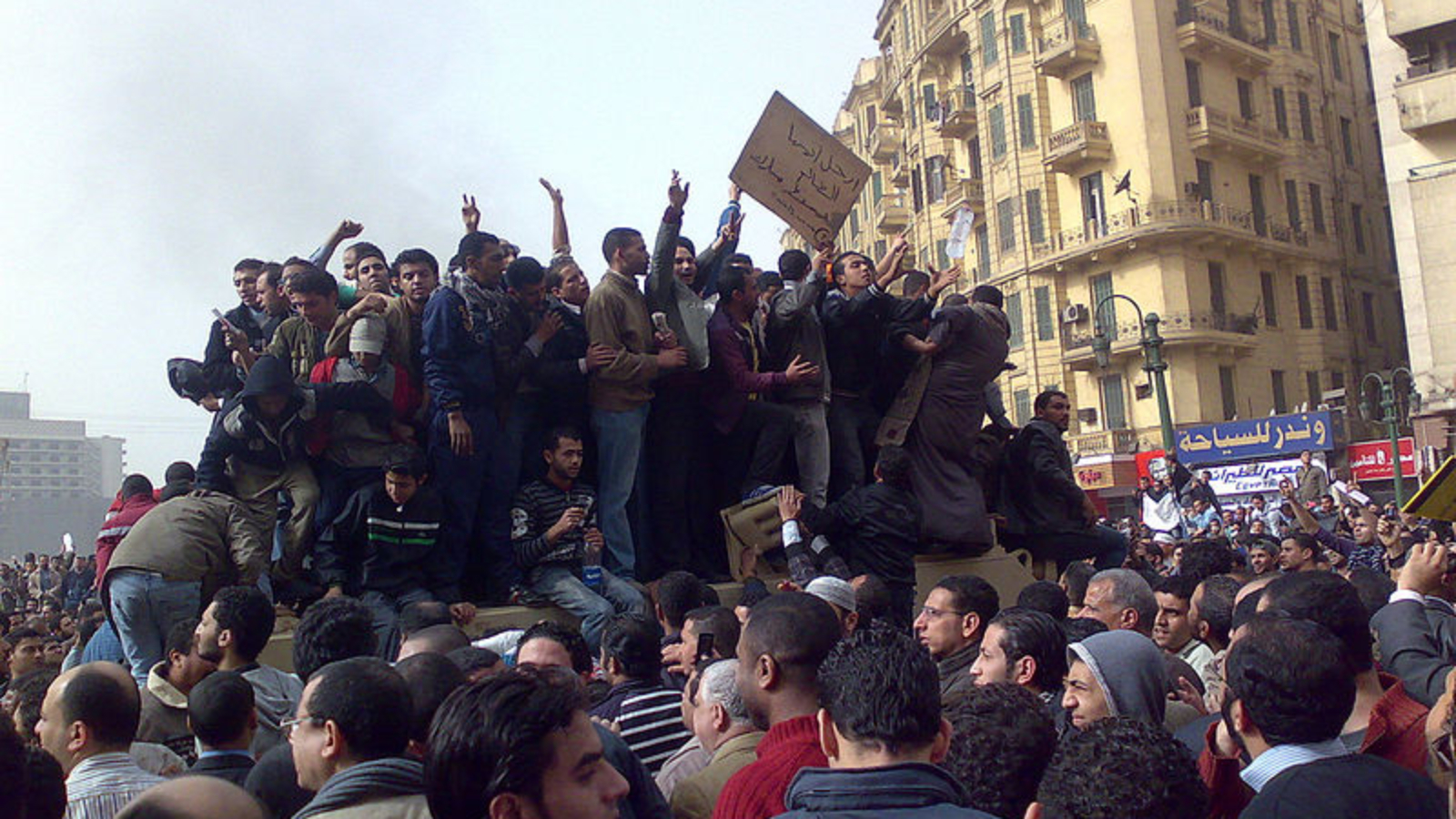Above: Demonstrators standing on an army vehicle in Tahrir Square, Cairo. Courtesy of Wikicommons.
[The following post was originally published by The Mantle.]
By Shaun Randol
At what point in a revolutionary moment do you put down the drums and take up the guns? It used to be that I was a stubborn advocate of total pacifism and non-violence. Over the past few years, however, I have shifted—very slowly—from that position. The sounds of gunfire and the sight of unarmed protesters scurrying for their lives in Tahrir Square in Cairo last night have once again given me pause.
Up until yesterday it appeared the demonstrators in Egypt had the chance of pulling off a genuine, non-violent revolution. To be sure, there had many injuries and a deaths leading up to Tuesday’s massive demonstrations in Tahrir Squareand elsewhere, but considering that by that time millions of Egyptians had been demonstrating for over a week, the violence was minimum. But yesterday saw what could be the end of that fantasy. Pro-Mubarak thugs mounted horses and camels and ran through crowds, trampling men, women, and children, shattering what had been a carnival-like atmosphere. And then after the sun set, gunfire crackled through the tense night. Shooting unarmed demonstrators, whether you agree with their position or not, is simply not acceptable. How to respond?
Watching all of this unfold live on the BBC and Al-Jazeera English, I was at first incredulous, and then angry. My emotions, of course, are no match for what those trapped in Tahrir Square must have felt—must be feeling right now. Fear. Anger.
The rule of Hosni Mubarak is finished, that much is clear. But will it now come to a violent end? For now, the octogenarian war hero-turned autocrat appears unmoved. The question that burns in my mind is, at what point do you put down the drums and pick up the guns?
Recently I had the opportunity to put a similar question to three architects of the 2007 Saffron Revolution in Burma. Led by Buddhist monks, the anti-government movement had all the makings of a truly peaceful revolution. The pacifist monks gained strength and momentum as the masses cheered them on, provided them with food and shelter, and shielded them from police and military retribution. Tens of thousands of Burmese citizens and monks joined in the anti-government demonstrations.
The peaceful movement did not last.
What had been building for months came to a violent end as the army beat protesters, raided and looted approximately 200 monasteries, made mass arrests, and sprayed demonstrators with tear gas and insect spray. At least one hundred people were killed and over one thousand arrested. This violent response from the ruling military junta effectively ended the attempted democratic revolution.
Given the government’s response, I asked three of the Burmese monks who helped organize the protest whether they would engage in or advocate taking up arms in the future in order to fulfill their democratic aspirations. Their answer was an unequivocal No, for two reasons: 1) their Buddhist tradition commands them to be peaceful and non-violent, and 2) violent actions would only engender further violence, as the ruling regime would certainly turn their arms against the people in order to remain in power. Being responsible for such bloodshed would be unthinkable.
The key factor in the Burmese situation, and for many potential democratic movements, may be to have the advantage of violent means. This does not necessarily mean that violence—weapons—must be used, but rather that the potential for their use must be in the hands of democratic revolutionaries, rather than the ruling regime. Generally, this means that the military can be the deciding factor. In Burma, this is not the case: the military rests firmly in the grip of the government (though the monks did say they sense cracks in the military structure). Without the military on their side, however, a democratic revolution like the one attempted in 2007 may not be possible.
In Egypt a different story is playing out. The military has proclaimed that they will not fire on protesters. Moreover, today they moved into Tahrir Square and elsewhere in a bid to protect anti-government demonstrators from being shot by pro-Mubarak thugs. There are also reports that the military will fire on anyone shooting at the pro-democratic activists.
With the military seemingly on their side, what turn do anti-Mubarak demonstrators now take? Do they continue to advance their original, peaceful revolution? Or, are they so shaken by the recent ugly turn of events that they take up arms in self-defense? With apparent military aid, will demonstrators feel emboldened to turn violent in order to oust Mubarak?
Which strategy will lead to the success of their cause? Let’s watch Al-Jazeera and find out.
Shaun Randol is the founder and editor in chief of The Mantle. He is also an Associate Fellow at the World Policy Institute.
